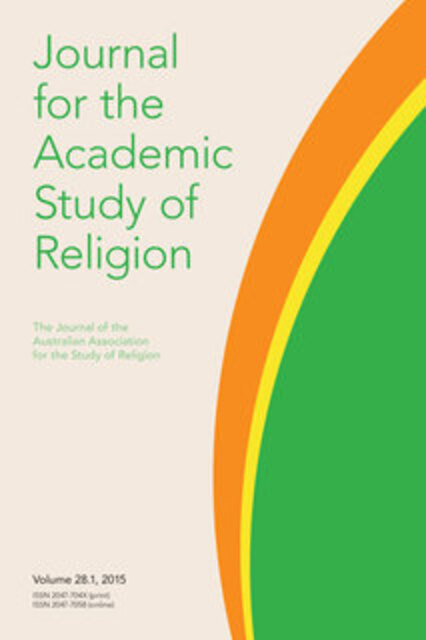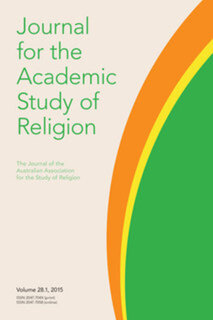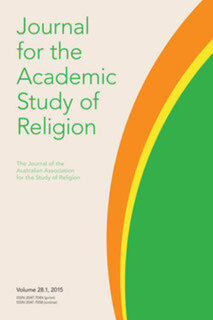Journal for the Academic Study of Religion
JASR is the leading peer-reviewed journal of the Pacific region dealing with all aspects of the academic study of religion and is affiliated with the Australian Association for the Study of Religion.
The journal publishes research that engages any topic, tradition, or methodology in the study of religion. As a generalist journal, it prioritizes high-quality submissions that communicate effectively across disciplinary boundaries.
Historically, JASR has been an important venue for scholarship on religion in the Southern Hemisphere. As it has developed an increasingly international orientation, this Antipodean legacy led to a distinctive interest in the significance of place.
In the open section of the journal, we publish, as the journal always has, interdisciplinary scholarship on religion in any geographical area.
The journal also engages with an ongoing theme – ‘Thinking Religion in Place’ – which addresses the way place shapes the methods and materials of religious studies. This theme is introduced in more detail in a paper which may be read below.
Through the articles published in this themed section, we hope to cultivate a scholarly conversation that explores answers to the question: What is the significance of place – including the scholar’s own location – to the study of religion?
We think about place in two ways. Most immediately, place points to the scholar’s situatedness in a location with historical, cultural, and geographical particularities. More broadly, place prompts us to consider the way this situatedness impacts the production of knowledge, shaped as it is by the global politics of place. We invite scholars to reflect critically both on their place on larger maps, and also on the impact of local and international forces on the phenomena that interest them.
Because the concept of ‘religion’ is deeply marked by the (modern, European) places in which it developed, we want to be clear that we take ‘thinking religion’ in its most capacious sense. This includes the study of recognized religious traditions, nonreligious thought and practice, spirituality (within and beyond religious communities), and the critical study of religion as a category of analysis.
Publication Details & Frequency
April, August, December
ISSN: 2047-704X (print)
ISSN: 2047-7058 (online)
Religion Library Collections
Encounters & Identities (Core Journal)
Selected articles included in other collections as designated below:

Latest Issue, Vol. 38 No. 1 (2025)
Articles
The Religious Conversion of Iranian Asylum-Seeking Women in the Process of Searching for Identity: The Case of Eskişehir
Rayehe Mozafarian, Fuat Güllüpınar, 1-24
Ritual Performance and Language in Modern Greek Neopaganism
Paraskevi Trifyllis, 25-43
The Spiritual Value of Tasmanian Wilderness Nonreligious Hikers and the Construction of Meaning
Misha Hoo, 44-68
Film Reviews
'The Wild Robot' (2024)
Michaela Richards, Michael Toy, 69-74
Book Reviews
Sajjad Adeliyan Tous and James T. Richardson,
'Managing Religion and Religious Changes in Iran: A Socio-Legal Analysis'
Milad Milani, 75-77
Helen de Cruz, 'Wonderstruck: How Wonder and Awe Shape the Way We Think'
Mari van Emmerik, 78-79
Mahjabeen Dhala, 'Feminist Theology and Social Justice in Islam: A Study on the Sermon of Fatima'
Ilya Syafa'atun Ni'mah, 80-81
Mark Jennings, 'Happy: LGBTQ+ Experiences of Australian Pentecostal-Charismatic Christianity'
Ibrahim Abraham, 82-84
Leonard C. Sebastian and Syed Huzaifah Bin Othman Alkaff, 'Indonesia and Islam in Transition'
Asmara Edo Kusuma, 85-87
Timothy Morton. 'Hell: In Search of a Christian Ecology'
Scott Robinson, 88-90
Diego Bubbio, 'Hegel, Heidegger and the Quest for the “I”'
Francesco Valagussa, 91-92
Information
Editorial Board
- This text has 0 annotations
- This text has 0 highlights
Editorial Mission Statement
- This text has 0 annotations
- This text has 0 highlights
We use cookies to analyze our traffic. Please decide if you are willing to accept cookies from our website. You can change this setting anytime in Privacy Settings.


